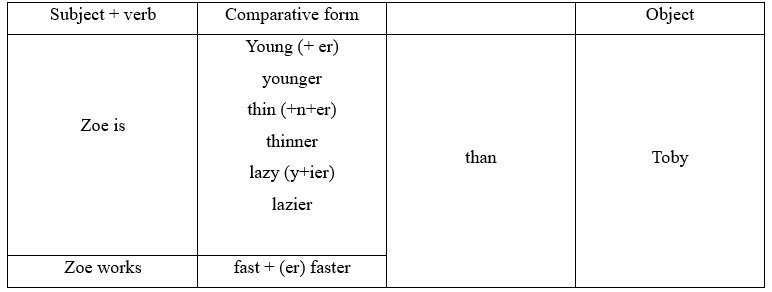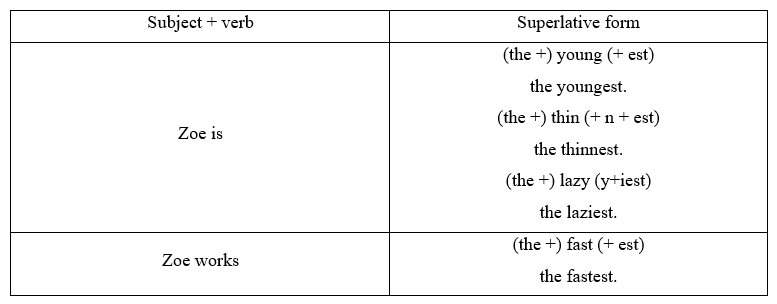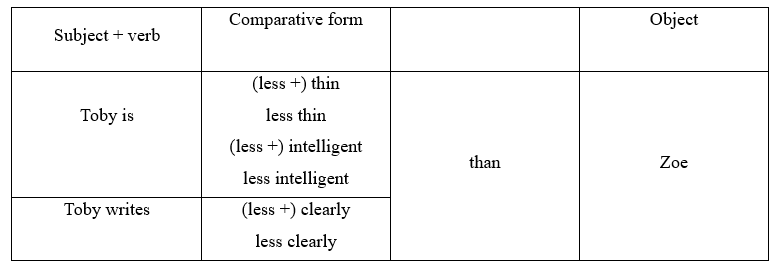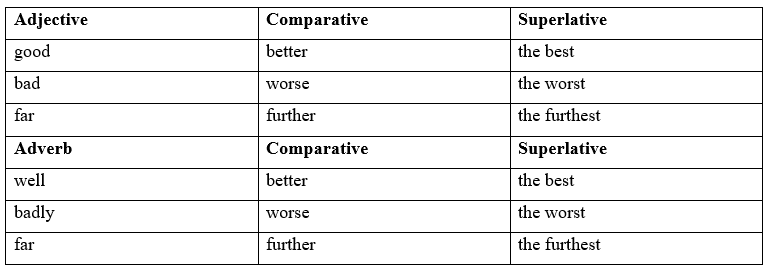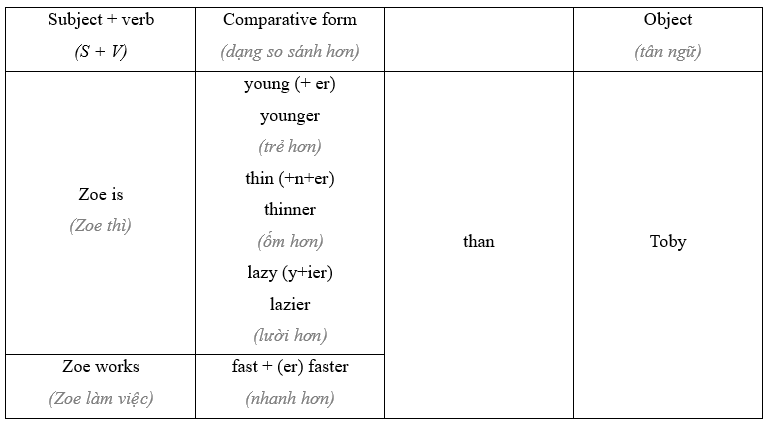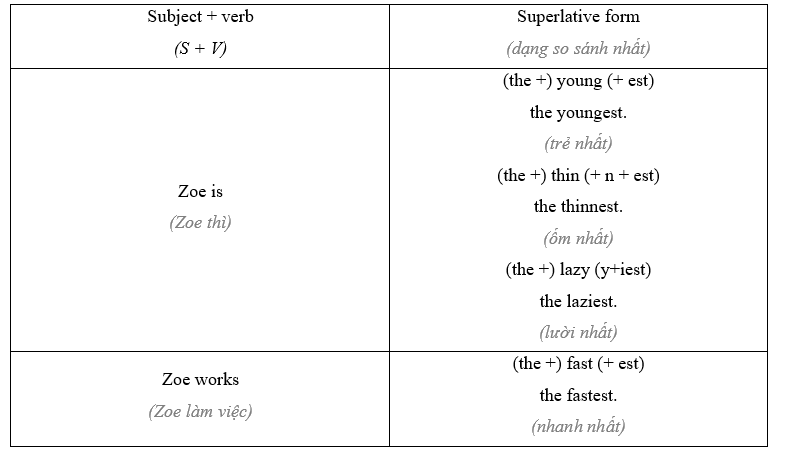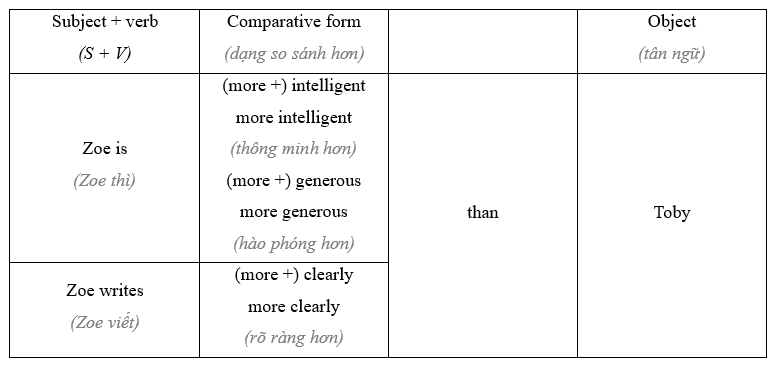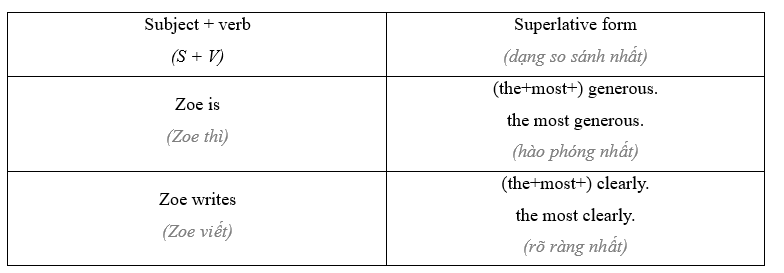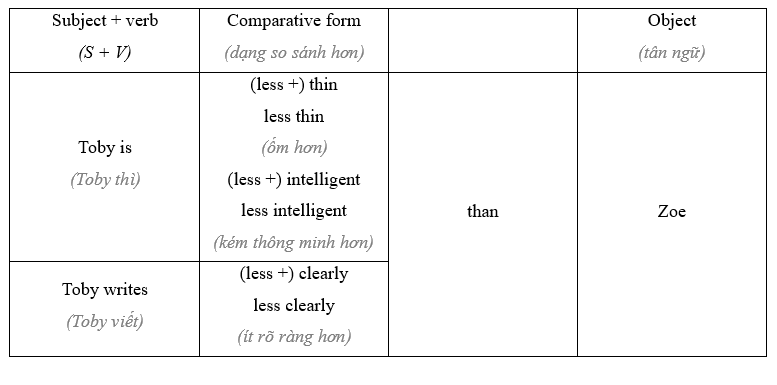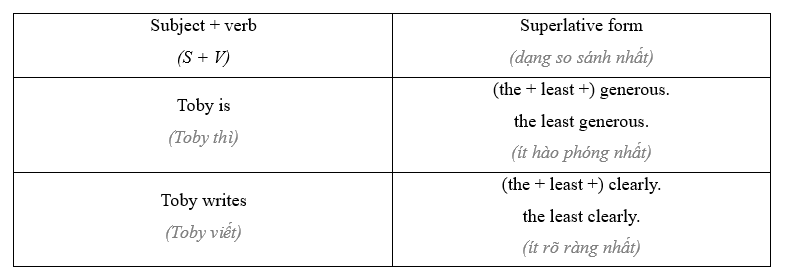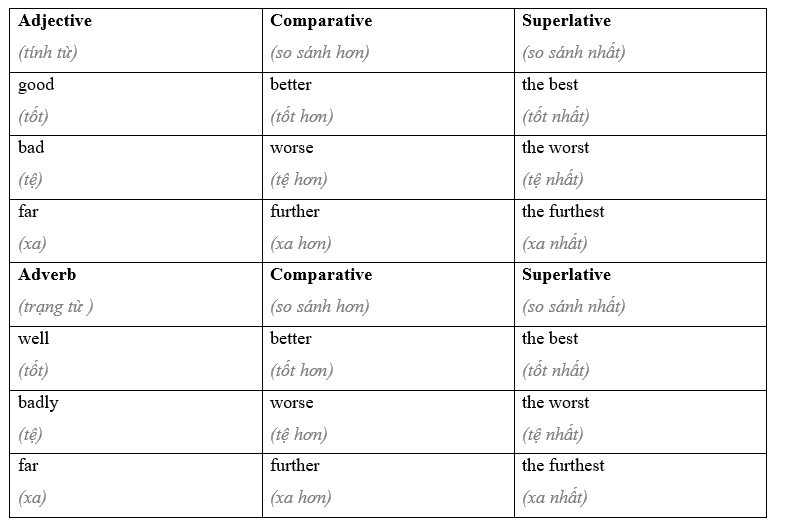Tiếng Anh 11 Grammar Builder – Unit 41 Correct the mistakes in the sentences. 2 Complete the sentences with the comparative form of the adverb in brackets and “than”. 3 Complete the sentences with the superlative form of the adverb in brackets. 4 Rewrite the sentences with less or least. 5 Complete the sentences with than or as and the phrases below. Tổng hợp đề thi học kì 2 lớp 11 tất cả các môn - Chân trời sáng tạo Toán - Văn - Anh - Lí - Hóa - Sinh
Lựa chọn câu để xem lời giải nhanh hơn
4.1 Comparison Bài 1 4.1 Comparison (So sánh) The comparative and superlative forms of adjectives and adverbs with one syllable are formed by adding -er or -est. The same is true of adjectives with two syllables ending in -y.
The comparative and superlative forms of adjectives and adverbs with two syllables or more are formed by putting more or the most before the adjective or adverb.
We can also form comparatives and superlatives of adjectives and adverbs with less and the least. Less is the opposite of more. Least is the opposite of most.
We can use less and least with uncountable nouns. I've got less spare time than you. Who's got the least money? We often use of after superlative adjectives. Jamie is the smallest of the three brothers. But we use in, not of, with a group or place (e.g. the world, the class, London). the best café in Oxford the most intelligent boy in the class the longest river in Africa We can make comparisons with clauses as well as with nouns. Gemma is more intelligent than you think. The weather is hotter than it was last week. We often use a superlative with the present perfect and ever. Alex has got the biggest dog I've ever seen! We can compare two things, using (not) as... as. Julie is as tall as Mike. (= They are the same height.) Leah isn't as tall as Joe. (= Joe is taller.) We use double comparatives to emphasise that something is changing. The weather is getting hotter and hotter. We use the... the and comparatives to say that one thing changes with another. The more carefully you check your work, the fewer mistakes you'll make. Remember irregular comparative and superlative forms.
Tạm dịch Dạng so sánh hơn và so sánh nhất của tính từ và trạng từ có một âm tiết được thành lập bằng cách thêm -er hoặc -est. Điều này cũng đúng với tính từ có hai âm tiết kết thúc bằng -y.
Dạng so sánh hơn và so sánh nhất của tính từ và trạng từ có hai âm tiết trở lên được hình thành bằng cách đặt more hoặc the most trước tính từ hoặc trạng từ.
Chúng ta cũng có thể hình thành dạng so sánh hơn và so sánh nhất của tính từ và trạng từ với less và the least. Ít hơn “less” là ngược lại với nhiều hơn “more”. Ít nhất “the least” là trái nghĩa của hầu hết “the most”.
Chúng ta có thể dùng less và least với danh từ không đếm được. Tôi có ít thời gian rảnh rỗi hơn bạn. Ai là người có ít tiền nhất? Chúng ta thường dùng of sau tính từ so sánh nhất. Jamie là người nhỏ nhất trong ba anh em. Nhưng chúng ta dùng in, not of, với một nhóm hoặc địa điểm (ví dụ: the world, the class, London). quán cà phê tốt nhất ở Oxford cậu bé thông minh nhất trong lớp con sông dài nhất ở châu Phi Chúng ta có thể so sánh với mệnh đề cũng như với danh từ. Gemma thông minh hơn bạn nghĩ. Thời tiết nóng hơn so với tuần trước. Chúng ta thường dùng so sánh nhất với thì hiện tại hoàn thành và từ trước đến nay. Alex có con chó lớn nhất mà tôi từng thấy! Chúng ta có thể so sánh hai thứ bằng cách sử dụng (not) as... as. Julie cao bằng Mike. (= Họ có cùng chiều cao.) Leah không cao bằng Joe. (= Joe cao hơn.) Chúng tôi sử dụng so sánh kép để nhấn mạnh rằng một cái gì đó đang thay đổi. Thời tiết ngày càng nóng hơn. Chúng ta sử dụng the... the và so sánh hơn để nói rằng một thứ thay đổi theo một thứ khác. Bạn càng kiểm tra công việc của mình cẩn thận bao nhiêu thì bạn càng mắc ít lỗi bấy nhiêu. Ghi nhớ các dạng so sánh hơn và so sánh nhất bất quy tắc.
1 Correct the mistakes in the sentences. (Sửa lỗi sai trong câu.) 1 I'm busyer today than I was yesterday. 2 He's the shortest boy of the class. 3 Kate's more short than Alice. 4 You're not as clever than me. 5 Today is longest day of the year. Lời giải chi tiết: 1 I'm busyer today than I was yesterday. Cách sửa: busyer => busier (bận rộn hơn) Câu hoàn chỉnh: I'm busier today than I was yesterday. (Hôm nay tôi bận hơn hôm qua.) 2 He's the shortest boy of the class. Cách sửa: of (của) => in (trong) Câu hoàn chỉnh: He's the shortest boy in the class. (Anh ấy là cậu bé thấp nhất trong lớp.) 3 Kate's more short than Alice. Cách sửa: more short => shorter (thấp hơn) Câu hoàn chỉnh: Kate's shorter than Alice. (Kate thấp hơn Alice.) 4 You're not as clever than me. Cách sửa: than => as (bằng) Câu hoàn chỉnh: You're not as clever as me. (Bạn không thông minh bằng tôi.) 5 Today is longest day of the year. Cách sửa: longest => the longest (dài nhất) Câu hoàn chỉnh: Today is the longest day of the year. (Hôm nay là ngày dài nhất trong năm.) 4.1 Comparison Bài 2 2 Complete the sentences with the comparative form of the adverb in brackets and “than”. (Hoàn thành các câu với dạng so sánh hơn của trạng từ trong ngoặc và “than”.) 1 Mum drives ____________Dad. (fast) 2 Dad drives _____________Mum. (well) 3 Fred writes _____________ Grace. (beautifully) 4 Harry works _____________ me. (slowly) 5 Pete usually arrives at school _____________ everyone else. (late) 6 Who speaks French _____________ (fluently): Dave or Bess? Phương pháp giải: Cấu trúc so sánh hơn với tính từ ngắn: S1 + V + tính từ ngắn + ER + THAN + S2. Cấu trúc so sánh hơn với tính từ dài: S1 + V + MORE + tính từ dài + THAN + S2. Lời giải chi tiết:
1 Mum drives faster than Dad. (fast) (Mẹ lái xe nhanh hơn bố.) 2 Dad drives better than Mum. (well) (Bố lái xe giỏi hơn mẹ.) 3 Fred writes more beautifully than Grace. (beautifully) (Fred viết đẹp hơn Grace.) 4 Harry works more slowly than me. (slowly) (Harry làm việc chậm hơn tôi.) 5 Pete usually arrives at school later than everyone else. (late) (Pete thường đến trường muộn hơn những người khác.) 6 Who speaks French more fluently (fluently): Dave or Bess? (Ai nói tiếng Pháp trôi chảy hơn: Dave hay Bess?) 4.1 Comparison Bài 3 3 Complete the sentences with the superlative form of the adverb in brackets. (Hoàn thành các câu với dạng so sánh nhất của trạng từ trong ngoặc.) 1 Who writes _______________? (neatly) 2 Sarah finished her homework _____________ (fast) 3 Tom plays chess _____________ (badly) 4 Joe speaks _____________ (loud) 5 lan definitely tries _____________ of all of us. (hard) 6 Who gets up _____________ in your family? (early) Phương pháp giải:
Cấu trúc so sánh nhất với tính từ ngắn: S1 + V + THE + tính từ ngắn + EST. Cấu trúc so sánh hơn với tính từ dài: S1 + V + THE MOST + tính từ dài. Lời giải chi tiết:
1 Who writes the most neatly? (neatly) (Ai viết gọn gàng nhất?) 2 Sarah finished her homework the fastest (fast) (Sarah hoàn thành bài tập về nhà nhanh nhất.) 3 Tom plays chess the worst (badly) (Tom chơi cờ tệ nhất.) 4 Joe speaks the loudest (loud) (Joe nói to nhất.) 5 lan definitely tries the hardest of all of us. (hard) (Lan chắc chắn là người cố gắng nhất trong tất cả chúng tôi.) 6 Who gets up the earliest in your family? (early) (Ai là người dậy sớm nhất trong gia đình bạn?)
4.1 Comparison Bài 4 4 Rewrite the sentences with less or least. (Viết lại câu với less hoặc least.) 1 Janet is more confident than Ryan. Ryan _____________________Janet. 2 Hannah and Ellie are more intelligent than Vicky. Vicky _____________________ of the three girls. 3 Marcus's house and Daniel's house are more spacious than Donna's. Donna's house _____________________ of the three. 4 Harriet's flat is more cramped than Clare's flat. Clare's flat _____________________ Harriet's flat. 5 Jess and Maisy live in a more lively area than Annie. Annie lives in ______________________ area. Phương pháp giải: Cấu trúc với câu với “less” (ít hơn): S1 + V + less + tính từ dài / danh từ không đếm được + than + S2. Cấu trúc với câu với “the least” (ít nhất): S1 + V + the least + tính từ dài / danh từ không đếm được. Lời giải chi tiết: 1 Janet is more confident than Ryan. (Janet tự tin hơn Ryan.) Ryan is less confident than Janet. (Ryan kém tự tin hơn Janet.) 2 Hannah and Ellie are more intelligent than Vicky. (Hannah và Ellie thông minh hơn Vicky.) Vicky is the least intelligent of the three girls. (Vicky là người kém thông minh nhất trong ba cô gái.) 3 Marcus's house and Daniel's house are more spacious than Donna's. (Nhà của Marcus và nhà của Daniel rộng rãi hơn nhà của Donna.) Donna's house is the least spacious of the three. (Ngôi nhà của Donna là ngôi nhà kém rộng rãi nhất trong ba ngôi nhà.) 4 Harriet's flat is more cramped than Clare's flat. (Căn hộ của Harriet chật chội hơn căn hộ của Clare.) Clare's flat is less cramped than Harriet's flat. (Căn hộ của Clare ít chật chội hơn căn hộ của Harriet.) 5 Jess and Maisy live in a more lively area than Annie. (Jess và Maisy sống ở khu sôi động hơn Annie.) Annie lives in the least lively area. (Annie sống ở khu vực ít sôi động nhất.) 4.1 Comparison Bài 5 5 Complete the sentences with than or as and the phrases below. (Hoàn thành các câu với than hoặc as và các cụm từ bên dưới.) I thought she would be I was before it looks from the outside
it was when I first moved into it there used to be 1 This part of town is much less popular than it used to be. (Phần này của thị trấn thì ít phổ biến hơn nhiều so với trước đây.) 2 My flat isn't as charming _________________ 3 The house is actually more spacious _________________ 4 Kelly wasn't as late _________________ 5 There are fewer contemporary buildings in the town centre _________________ 6 I'm happier in my new flat _________________ Phương pháp giải: *Nghĩa của các cụm từ - I thought she would be: tôi đã nghĩ cô ấy sẽ là - I was before: Tôi đã từng - it looks from the outside: nó nhìn từ bên ngoài - it used to be: nó từng là - it was when I first moved into it: đó là khi tôi lần đầu tiên chuyển đến nó - there used to be: đã từng có Lời giải chi tiết: 2 My flat isn't as charming as it was when I first moved into it. (Căn hộ của tôi không còn đẹp như khi tôi mới chuyển đến.) 3 The house is actually more spacious than it looks from the outside. (Ngôi nhà thực sự rộng rãi hơn so với khi nhìn từ bên ngoài.) 4 Kelly wasn't as late as I was before. (Kelly không còn trễ như tôi trước đây.) 5 There are fewer contemporary buildings in the town centre than there used to be. (Có ít tòa nhà hiện đại hơn ở trung tâm thị trấn so với trước đây.) 6 I'm happier in my new flat than I thought she would be. (Tôi hạnh phúc hơn trong căn hộ mới của mình hơn là tôi nghĩ cô ấy sẽ như thế.)
4.1 Comparison Bài 6 6 USE OF ENGLISH Complete the second sentence so that it means the same as the first. Use the words in brackets. (Hoàn thành câu thứ hai sao cho nghĩa giống như câu thứ nhất. Sử dụng các từ trong ngoặc.) 1 My car is smaller than yours. My car _________________ (as) 2 There aren't as many people on the beach now. There _________________ (fewer) 3 Flats are usually cheaper than houses. Flats _________________. (expensive) 4 The weather is becoming increasingly hot. The weather ________________. (hotter) 5 We've never stayed in a less spacious hotel room. This is _________________ (least) 6 As you spend more on the flat, it becomes more valuable. The _________________ (the) 7 I didn't think the rent would be so high. The rent _________________(than) Phương pháp giải: Cấu trúc so sánh hơn với tính từ ngắn: S1 + V + tính từ ngắn + ER + THAN + S2. Cấu trúc so sánh hơn với tính từ dài: S1 + V + MORE + tính từ dài + THAN + S2. Cấu trúc so sánh nhất với tính từ ngắn: S1 + V + THE + tính từ ngắn + EST. Cấu trúc so sánh hơn với tính từ dài: S1 + V + THE MOST + tính từ dài. Cấu trúc so sánh bằng: S1 + V + AS + tính từ / trạng từ + AS + S2. Cấu trúc so sánh đồng tiến: The + so sánh hơn + S + V, The + so sánh hơn + S + V. Lời giải chi tiết: 1 My car is smaller than yours. (Xe của tôi nhỏ hơn của bạn.) My car isn’t as big as yours. (as) (Xe của tôi không lớn bằng của bạn.) 2 There aren't as many people on the beach now. (Bây giờ không có nhiều người trên bãi biển.) There are fewer people on the beach now. (fewer) (Có ít người hơn trên bãi biển bây giờ.) 3 Flats are usually cheaper than houses. (Căn hộ thường rẻ hơn nhà ở.) Flats aren’t usually as expensive as houses. (expensive) (Căn hộ thường không đắt bằng nhà ở.) 4 The weather is becoming increasingly hot. (Thời tiết ngày càng trở nên nóng bức.) The weather is getting hotter. (hotter) (Thời tiết ngày càng nóng hơn.) 5 We've never stayed in a less spacious hotel room. (Chúng tôi chưa bao giờ ở trong một phòng khách sạn ít rộng rãi hơn.) This is the least spacious hotel room we've ever stayed in. (least) (Đây là phòng khách sạn kém rộng rãi nhất mà chúng tôi từng ở.) 6 As you spend more on the flat, it becomes more valuable. (Khi bạn chi tiêu nhiều hơn cho căn hộ, nó sẽ trở nên có giá trị hơn.) The more you spend on the flat, the more valuable it becomes. (the) (Bạn càng chi nhiều tiền cho căn hộ, nó càng trở nên có giá trị.) 7 I didn't think the rent would be so high. (Tôi không nghĩ tiền thuê nhà lại cao như vậy.) The rent is higher than I thought. (than) (Tiền thuê nhà cao hơn tôi nghĩ.)
4.2 The second conditional Bài 1 4.2 The second conditional (Câu điều kiện loại hai) We use the second conditional to talk about an imaginary situation or event and its result. If I lived in a bigger house, I'd have parties every weekend. We form the second conditional by using the past simple in the conditional if clause and would + infinitive in the result clause.
Notice that you can use were instead of was in the conditional clause with I, he and she. Both was and were are generally acceptable, although using were is considered more correct, especially in formal situations. If I were you, I'd spend more time revising. If she were older, she'd find her own flat. We normally use could for would + can. If we lived nearer to each other, we could meet up more often. Tạm dịch Chúng ta sử dụng câu điều kiện loại hai để nói về một tình huống hoặc sự kiện tưởng tượng và kết quả của nó. Nếu tôi sống trong một ngôi nhà lớn hơn, tôi sẽ có những bữa tiệc vào mỗi cuối tuần. Chúng ta hình thành câu điều kiện loại hai bằng cách sử dụng thì quá khứ đơn trong mệnh đề if có điều kiện và would + nguyên thể trong mệnh đề kết quả.
Lưu ý rằng bạn có thể dùng were thay cho was trong mệnh đề điều kiện với I, he và she. Cả hai was và were thường được chấp nhận, mặc dù cách dùng were được coi là đúng hơn, đặc biệt là trong các tình huống trang trọng. Nếu tôi là bạn, tôi sẽ dành nhiều thời gian hơn để ôn tập. Nếu cô ấy lớn hơn, cô ấy sẽ tìm được căn hộ của riêng mình. Chúng ta thường dùng could cho would + can. Nếu chúng tôi sống gần nhau hơn, chúng tôi có thể gặp nhau thường xuyên hơn.
1 Complete the second sentence in each pair to mean the same as the first. Use the second conditional. (Hoàn thành câu điều kiện loại 2 trong mỗi cặp để có nghĩa tương tự như câu đầu tiên. Sử dụng câu điều kiện loại hai.) 1 I can't drive a car; I'm too young. If ____________________, ________________ a car. 2 He won't offer you a job; you aren't reliable enough. If ____________________, ________________ a job. 3 She hasn't got a dog; her flat is really small. If her flat ____________________, ________________ a dog. 4 I can't use my brother's phone; I don't know the password. If I ____________________, ________________ my brother's phone. 5 She isn't a good guitarist; she doesn't practise. If ____________________, ________________ a good guitarist. 6 We can't go to the beach; it isn't sunny today. If ____________________, ________________ to the beach. Phương pháp giải: Cấu trúc câu điều kiện loại 2: If + S + V2/ed, S + would / could + Vo (nguyên thể) Lưu ý: tobe trong câu điều kiện loại 2 luôn là “were” cho mọi chủ ngữ. Lời giải chi tiết: 1 I can't drive a car; I'm too young. (Tôi không thể lái xe ô tô; Tôi còn quá trẻ.) If I were old enough, I would learn to drive a car. (Nếu tôi đủ lớn, tôi sẽ học lái xe ô tô.) 2 He won't offer you a job; you aren't reliable enough. (Anh ta sẽ không cho bạn một công việc; bạn không đủ tin cậy) If you were reliable enough, he would offer you a job. (Nếu bạn đủ tin cậy, anh ấy sẽ đề nghị cho bạn một công việc.) 3 She hasn't got a dog; her flat is really small. (Cô ấy không nuôi chó; căn hộ của cô ấy thực sự rất nhỏ.) If her flat were bigger, she would get a dog. (Nếu căn hộ của cô ấy lớn hơn, cô ấy sẽ có một con chó.) 4 I can't use my brother's phone; I don't know the password. (Tôi không thể sử dụng điện thoại của anh trai tôi; Tôi không biết mật khẩu.) If I knew the password, I would use my brother's phone. (Nếu tôi biết mật khẩu, tôi sẽ sử dụng điện thoại của anh trai tôi.) 5 She isn't a good guitarist; she doesn't practise. (Cô ấy không phải là một người chơi guitar giỏi; cô ấy không tập luyện.) If she practised, she would be a good guitarist. (Nếu cô ấy luyện tập, cô ấy sẽ là một tay guitar giỏi.) 6 We can't go to the beach; it isn't sunny today. (Chúng tôi không thể đi biển; hôm nay trời không nắng.) If it were sunny today, we would go to the beach. (Nếu hôm nay trời nắng, chúng tôi sẽ đi biển.) 4.2 The second conditional Bài 2 2 Complete these second conditional sentences with the correct verb form and your own ideas. (Hoàn thành các câu điều kiện loại hai này với dạng động từ đúng và ý của riêng bạn.) 1 If I ___________ (live) in the USA, ________________________ 2 If I ___________ (have) ten brothers and sisters, ________________________ 3 If humans ___________ (can) fly, ________________________ 4 If I ___________ (can) travel through time, ________________________ 5 If computers ___________ (not exist), ________________________ 6 If I___________ (find) a diamond ring, ________________________ Phương pháp giải: Cấu trúc câu điều kiện loại 2: If + S + V2/ed, S + would / could + Vo (nguyên thể) Lưu ý: tobe trong câu điều kiện loại 2 luôn là “were” cho mọi chủ ngữ. *Nghĩa của từ vựng live – lived (v): sống. have – had (v): có can – could: có thể exist – existed (v): tồn tại find – found (v): tìm thấy Lời giải chi tiết: 1 If I lived (live) in the USA, I would visit New York City. (Nếu tôi sống ở Mỹ, tôi sẽ đến thăm thành phố New York.) 2 If I had (have) ten brothers and sisters, I would never feel lonely. (Nếu tôi có mười anh chị em, tôi sẽ không bao giờ cảm thấy cô đơn.) 3 If humans could (can) fly, we would save a lot of time on transportation. (Nếu con người có thể bay, chúng ta sẽ tiết kiệm được rất nhiều thời gian cho việc di chuyển.) 4 If I could (can) travel through time, I would visit ancient Egypt. (Nếu tôi có thể du hành xuyên thời gian, tôi sẽ đến thăm Ai Cập cổ đại.) 5 If computers did not exist (not exist), we could not learn effectively. (Nếu máy tính không tồn tại, chúng ta sẽ không thẻ học tập hiệu quả.) 6 If I found (find) a diamond ring, I would return it to its owner. (Nếu tôi tìm thấy một chiếc nhẫn kim cương, tôi sẽ trả lại cho chủ nhân của nó.)
4.3 I wish..., If only ... Bài 1 4.3 I wish..., If only ... (Ước gì..., giá mà...) We use I wish... or if only... with the past simple to say that we want a situation to be different from how it really is. I live in a village. I wish I lived in a big city. Notice that you can use were instead of was after I wish ... or If only.... It's Monday today, but I wish it were Saturday. We use I wish ... or If only... with would + the infinitive without to to say that we want somebody (or something) to behave differently. I wish she wouldn't shout. If only the phone would stop ringing. Tạm dịch Chúng ta sử dụng I wish... or if only... với thì quá khứ đơn để nói rằng chúng ta muốn một tình huống khác với thực tế của nó. Tôi sống ở một ngôi làng. Tôi ước tôi sống ở một thành phố lớn. Lưu ý rằng bạn có thể sử dụng were thay vì was sau I wish ... hoặc If only.... Hôm nay là thứ Hai, nhưng tôi ước nó là thứ Bảy. Chúng ta sử dụng I wish ... hoặc If only... với would + động từ nguyên mẫu không có to để nói rằng chúng ta muốn ai đó (hoặc cái gì đó) cư xử khác đi. Tôi ước cô ấy sẽ không hét lên. Giá như điện thoại ngừng đổ chuông.
1 Rewrite these critical sentences using I wish ... or If only ... + would. (Viết lại những câu chỉ trích này bằng cách sử dụng I wish ... hoặc If only ... + would.) 1 Jack is always forgetting his sports kit. (Jack luôn quên bộ dụng cụ thể thao của mình.) I wish Jack wouldn't forget his sports kit. (Tôi ước Jack sẽ không quên bộ đồ thể thao của anh ấy.) 2 My dad is always singing in the shower. 3 She's always sending me text messages at night. 4 You're always borrowing my dictionary. 5 Our car is always breaking down on the motorway. 6 You're always telling people my secrets. Phương pháp giải: Cấu trúc ước / giá như: I wish / If only + S + would (not) + Vo (nguyên thể) Lời giải chi tiết: 2 My dad is always singing in the shower. (Bố tôi luôn hát trong khi tắm.) Đáp án: I wish my dad wouldn't sing in the shower. (Tôi ước bố tôi sẽ không hát khi tắm.) 3 She's always sending me text messages at night. (Cô ấy luôn gửi tin nhắn cho tôi vào ban đêm.) Đáp án: If only she wouldn't send me text messages at night. (Giá như cô ấy không gửi tin nhắn cho tôi vào ban đêm.) 4 You're always borrowing my dictionary. (Bạn luôn mượn từ điển của tôi.) Đáp án: If only you wouldn't borrow my dictionary. (Giá như bạn không mượn từ điển của tôi.) 5 Our car is always breaking down on the motorway. (Xe của chúng tôi luôn bị hỏng trên đường cao tốc.) Đáp án: If only our car wouldn't break down on the motorway. (Giá mà xe của chúng tôi không bị hỏng trên đường cao tốc.) 6 You're always telling people my secrets. (Bạn luôn nói với mọi người những bí mật của tôi.) Đáp án: I wish you wouldn't tell people my secrets. (Tôi ước bạn sẽ không nói với mọi người những bí mật của tôi.)
4.3 I wish..., If only ... Bài 2 2 Complete the sentences with the past simple or would + the infinitive without to form of the verbs in brackets. (Hoàn thành các câu với thì quá khứ đơn hoặc would + động từ nguyên mẫu không có dạng của động từ trong ngoặc.) 1 I wish I _________(have) a brother or sister. 2 If only they _________(stop) talking - I can't hear the film. 3 I wish you _________ (take) a photo of me so I could send it to my friends. 4 If only we _________ (understand) Spanish, we could ask for directions. 5 I wish you _________(like) Chinese food; I don't want pizza again. 6 I wish you _________(finish) that burger; I don't like the smell. Phương pháp giải: * Cấu trúc I wish / If only: I wish / If only + S + V2/ed: mong muốn một việc trái với thực tế của nó. I wish / If only + S + would + Vo (nguyên thể): mong muốn ai đó cư xử hoặc hành động khác đi. *Nghĩa của từ vựng have – had (v): có stop – stopped (v): dừng lại take – took (v): chụp understand – understood (v): hiểu like – liked (v): thích finish – finished (v): xong Lời giải chi tiết:
1 I wish I had (have) a brother or sister. (Tôi ước mình có anh trai hoặc em gái.) 2 If only they would stop (stop) talking - I can't hear the film. (Giá như họ ngừng nói chuyện - Tôi không thể nghe thấy bộ phim.) 3 I wish you would take (take) a photo of me so I could send it to my friends. (Tôi ước bạn sẽ chụp một bức ảnh của tôi để tôi có thể gửi cho bạn bè của mình.) 4 If only we understood (understand) Spanish, we could ask for directions. (Giá như chúng tôi hiểu tiếng Tây Ban Nha, chúng tôi có thể hỏi đường.) 5 I wish you liked (like) Chinese food; I don't want pizza again. (Tôi ước bạn thích đồ ăn Trung Quốc; Tôi không muốn ăn pizza nữa.) 6 I wish you would finish (finish) that burger; I don't like the smell. (Tôi ước bạn sẽ ăn hết cái bánh mì kẹp thịt đó; Tôi không thích cái mùi đó.)
4.4 would rather, had better Bài 1 4.4 would rather, had better (thà, tốt hơn nên) We use would rather (not) + the infinitive without to to express a preference. I'd rather (not) stay at home. We use would rather + subject + past simple to say we would prefer a situation to be different. She'd rather her friends were more outgoing. We use had better + the infinitive without to to say what we or somebody else should do. I'd / You'd better ask before I / you borrow that bike. Tạm dịch Chúng ta sử dụng would rather (not) + động từ nguyên mẫu không có to để diễn đạt một sở thích. Tôi thà (không) ở nhà. Chúng ta sử dụng would rather + chủ ngữ + quá khứ đơn để nói rằng chúng ta muốn một tình huống khác đi. Cô ấy muốn bạn bè của mình cởi mở hơn. Chúng ta sử dụng had better + động từ nguyên mẫu không to để nói chúng ta hoặc ai đó nên làm gì. Tôi muốn / Bạn nên hỏi trước khi tôi / bạn mượn chiếc xe đạp đó.
1 Write a preference using I'd rather and the words in brackets. Include any other words that are necessary. (Viết một sở thích sử dụng I'd rather và các từ trong ngoặc đơn. Bao gồm bất kỳ từ nào khác nếu cần thiết.) 1 My friends all play basketball. (football) (Tất cả bạn bè của tôi đều chơi bóng rổ.) I'd rather they played football. (Tôi muốn họ chơi bóng đá.) 2 I live near the sea. (mountains) 3 My sister often gives me books. (CDs) 4 My friend Sally always arrives late. (early) 5 My dad usually cooks pasta for dinner. (burgers) 6 Our neighbours have got a large dog. (a cat) Phương pháp giải: *Cấu trúc với “rather” (thà / muốn): S1 + would rather + Vo S1 + would rather + S2 + V2/ed. *Nghĩa của các từ trong ngoặc mountains (n): núi CDs (n): những đĩa CD early (adv): sớm burgers (n): bánh mì kẹp thịt a cat (n): một con mèo Lời giải chi tiết: 2 I live near the sea. (mountains) (Tôi sống gần biển.) Đáp án: I'd rather live near the mountains (Tôi thích sống gần núi) 3 My sister often gives me books. (CDs) (Em gái tôi thường tặng sách cho tôi.) Đáp án: I'd rather my sister gave me CDs (Tôi muốn em gái đưa đĩa CD cho tôi hơn.) 4 My friend Sally always arrives late. (early) (Bạn tôi Sally luôn đến muộn.) Đáp án: I'd rather Sally arrived early. (Tôi muốn Sally đến sớm hơn.) 5 My dad usually cooks pasta for dinner. (burgers) (Bố tôi thường nấu mì ống cho bữa tối.) Đáp án: I'd rather my dad cooked burgers for dinner. (Tôi muốn bố tôi nấu bánh mì kẹp thịt cho bữa tối.) 6 Our neighbours have got a large dog. (a cat) (Hàng xóm của chúng tôi có một con chó lớn.) Đáp án: I'd rather our neighbors had a cat. (Tôi muốn hàng xóm của chúng tôi có một con mèo hơn.)
4.4 would rather, had better Bài 2 2 Rewrite the advice using had better instead of should or ought to. (Viết lại lời khuyên bằng cách sử dụng had better thay vì should hoặc ought to.) 1 I don't think you should phone her now. (Tôi không nghĩ bạn nên gọi điện thoại cho cô ấy bây giờ.) You'd better not phone her now. (Bạn không nên gọi điện thoại cho cô ấy bây giờ.) 2 I think we should save some money for the journey. 3 I don't think you should tell her about that email. 4 We ought to go home-it's late. 5 I think we should work hard for these exams. 6 I don't think you should drink that milk; it smells funny. Phương pháp giải: Cấu trúc viết câu với “had better” (nên): S + had better + (not) + Vo (nguyên thể) Lời giải chi tiết: 2 I think we should save some money for the journey. (Tôi nghĩ chúng ta nên tiết kiệm một số tiền cho cuộc hành trình.) Đáp án: We had better save some money for the journey. (Tốt hơn là chúng ta nên tiết kiệm một số tiền cho cuộc hành trình.) 3 I don't think you should tell her about that email. (Tôi không nghĩ bạn nên nói với cô ấy về email đó.) Đáp án: You had better not tell her about that email. (Tốt hơn là bạn không nên nói với cô ấy về email đó.) 4 We ought to go home - it's late. (Chúng ta nên về nhà - muộn rồi.) Đáp án: We had better go home - it's late. (Tốt hơn chúng ta nên về nhà - muộn rồi.) 5 I think we should work hard for these exams. (Tôi nghĩ chúng ta nên học hành chăm chỉ cho các kỳ thi này.) Đáp án: We had better work hard for these exams. (Tốt hơn là chúng ta nên học hành chăm chỉ cho những kỳ thi này.) 6 I don't think you should drink that milk; it smells funny. (Tôi không nghĩ bạn nên uống sữa đó; nó có mùi lạ lắm.) Đáp án: You had better not drink that milk; it smells funny. (Bạn không nên uống sữa đó; nó có mùi lạ lắm.)
>> 2K9 Học trực tuyến - Định hướng luyện thi TN THPT, ĐGNL, ĐGTD ngay từ lớp 11 (Xem ngay) cùng thầy cô giáo giỏi trên Tuyensinh247.com. Bứt phá điểm 9,10 chỉ sau 3 tháng, tiếp cận sớm các kì thi.
|













